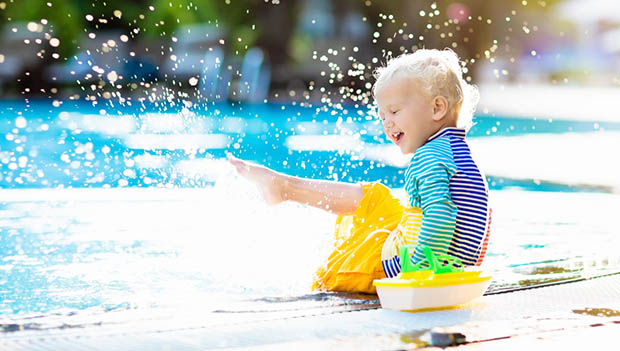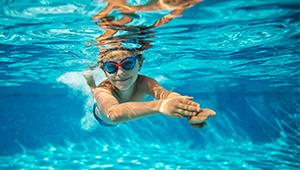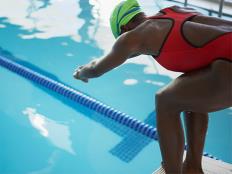
It doesn't feel like summer without frequent trips to the ocean, lake or pool (or all three!). Summertime swimming is a great way to spend time as a family, but before you hit the water, make sure you know these important swim safety tips. They'll help keep your family safe and ensure that your days in the sun stay fun.
Swim Where There Is a Lifeguard
Whenever possible, choose to take your family swimming in an area where a lifeguard is on duty. Lifeguards are trained to recognize distressed swimmers, and they know how to perform CPR should the worst happen. Do not, however, solely rely on lifeguards to watch your kids in the water. At least one parent should be supervising the kids at all times.
Stay Hydrated
When you're swimming in the cool water all day long it's easy to forget that you're losing fluids. Remember to spend time rehydrating throughout the day and remind the kids to do the same. Dehydration can lead to headaches, cramps and in extreme instances, serious illness and even death.
Wear Sunscreen
Sunburns can really ruin the day and damage skin in the process. Before leaving home, lather the whole family in sunscreen and allow at least 20 minutes for it to settle before getting in the water. Reapply sunscreen every 90 minutes and wear sunglasses to protect eyes from sun damage. Floppy hats and SPF bathing suits/clothing are also recommended.
Know CPR
It will bring you peace of mind to stay up-to-date on your CPR certification so that if there's an emergency, you can administer the life-saving procedure to anyone who may suffer an accident while swimming. It's also good practice to carry your cell phone and keep your swimming location at the top of your mind in case you have to call 911 for help.
Never Leave Your Child Unattended Near Water
This seems like a no-brainer, but it's easy to get distracted when you're out on the water with your kids, especially if you're socializing in a large group. To ensure that there is always at least one pair of adult eyes on the youngsters, designate a parent to be "on duty" and keep track of the kids until their shift is over and the next parent takes on the responsibility.
Empty Portable Pools
If you're filling up a backyard kiddie pool to keep small kids cool, make sure to empty the pool as soon as you are done using it and to store it upside down. This practice helps prevent accidental drowning by not only emptying the pool when finished but by preventing rainwater to collect and cause a potential drowning hazard down the line.
Warn Your Kids About Rafts and Other Large Flotation Devices
Even if your kids are excellent swimmers, a pool packed with rafts and other large flotation devices can prove hazardous by trapping kids underwater when they come up to take a breath. If your family is swimming in an area with a lot of rafts, warn your kids about their presence and teach them to steer clear.
Safely Enter and Exit the Pool
Most diving accidents don't involve a diving board but rather occur when the swimmer runs and misjudges distances, hitting their head on the side or bottom of the pool. Teach your kids that the only safe way to enter the pool is at the steps or the ladder and that running around the perimeter of the pool is not allowed.
Wear U.S. Coast Guard-Approved Life Jackets
Young children that don't know how to swim or aren't strong swimmers should always wear a U.S. Coast Guard-approved life jacket. However, a life jacket should be worn in addition to, not in place of, adult supervision. Additionally, the Red Cross recommends teaching children to always ask for permission before going near the water. This will teach kids that it isn't safe to enter the water unless a parent is actively supervising.
READ THIS NEXT: 7 Hygiene and Safety Tips for Public Pools









Discuss This Article